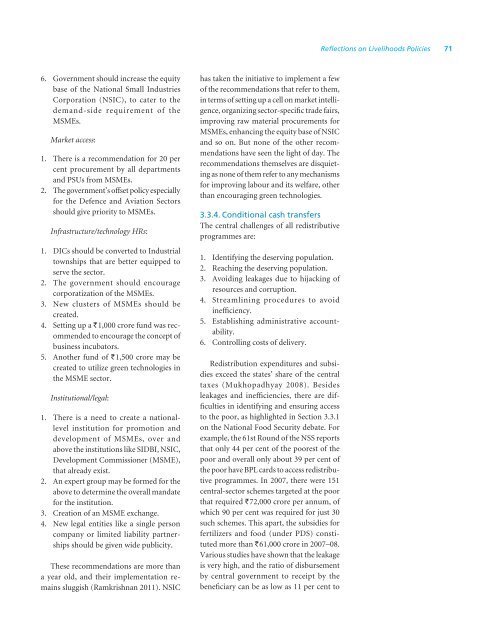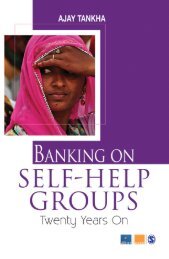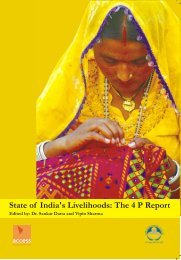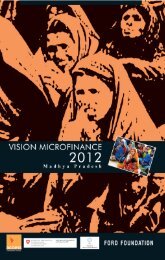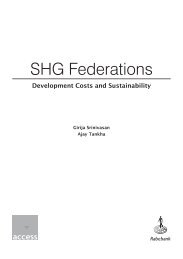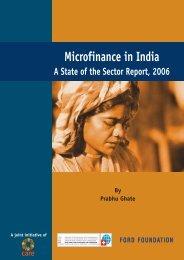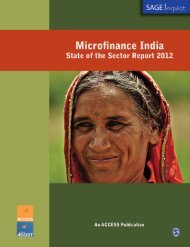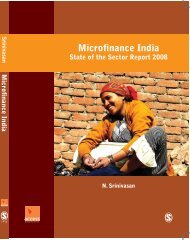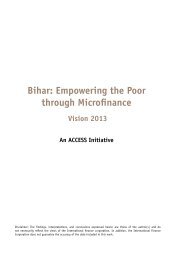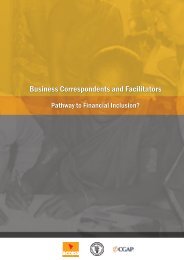SOIL Report 2011 - ACCESS Development Services
SOIL Report 2011 - ACCESS Development Services
SOIL Report 2011 - ACCESS Development Services
- No tags were found...
You also want an ePaper? Increase the reach of your titles
YUMPU automatically turns print PDFs into web optimized ePapers that Google loves.
Reflections on Livelihoods Policies 716. Government should increase the equitybase of the National Small IndustriesCorporation (NSIC), to cater to thedemand-side requirement of theMSMEs.Market access:1. There is a recommendation for 20 percent procurement by all departmentsand PSUs from MSMEs.2. The government’s offset policy especiallyfor the Defence and Aviation Sectorsshould give priority to MSMEs.Infrastructure/technology HRs:1. DICs should be converted to Industrialtownships that are better equipped toserve the sector.2. The government should encouragecorporatization of the MSMEs.3. New clusters of MSMEs should becreated.4. Setting up a `1,000 crore fund was recommendedto encourage the concept ofbusiness incubators.5. Another fund of `1,500 crore may becreated to utilize green technologies inthe MSME sector.Institutional/legal:1. There is a need to create a nationallevelinstitution for promotion anddevelopment of MSMEs, over andabove the institutions like SIDBI, NSIC,<strong>Development</strong> Commissioner (MSME),that already exist.2. An expert group may be formed for theabove to determine the overall mandatefor the institution.3. Creation of an MSME exchange.4. New legal entities like a single personcompany or limited liability partnershipsshould be given wide publicity.These recommendations are more thana year old, and their implementation remainssluggish (Ramkrishnan <strong>2011</strong>). NSIChas taken the initiative to implement a fewof the recommendations that refer to them,in terms of setting up a cell on market intelligence,organizing sector-specific trade fairs,improving raw material procurements forMSMEs, enhancing the equity base of NSICand so on. But none of the other recommendationshave seen the light of day. Therecommendations themselves are disquietingas none of them refer to any mechanismsfor improving labour and its welfare, otherthan encouraging green technologies.3.3.4. Conditional cash transfersThe central challenges of all redistributiveprogrammes are:1. Identifying the deserving population.2. Reaching the deserving population.3. Avoiding leakages due to hijacking ofresources and corruption.4. Streamlining procedures to avoidinefficiency.5. Establishing administrative accountability.6. Controlling costs of delivery.Redistribution expenditures and subsidiesexceed the states’ share of the centraltaxes (Mukhopadhyay 2008). Besidesleakages and inefficiencies, there are difficultiesin identifying and ensuring accessto the poor, as highlighted in Section 3.3.1on the National Food Security debate. Forexample, the 61st Round of the NSS reportsthat only 44 per cent of the poorest of thepoor and overall only about 39 per cent ofthe poor have BPL cards to access redistributiveprogrammes. In 2007, there were 151central-sector schemes targeted at the poorthat required `72,000 crore per annum, ofwhich 90 per cent was required for just 30such schemes. This apart, the subsidies forfertilizers and food (under PDS) constitutedmore than `61,000 crore in 2007–08.Various studies have shown that the leakageis very high, and the ratio of disbursementby central government to receipt by thebeneficiary can be as low as 11 per cent to


